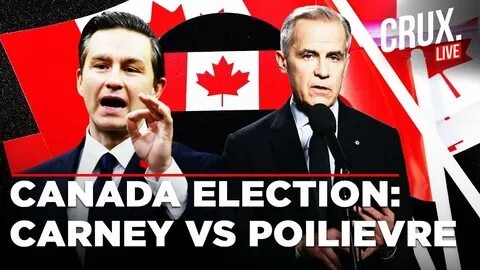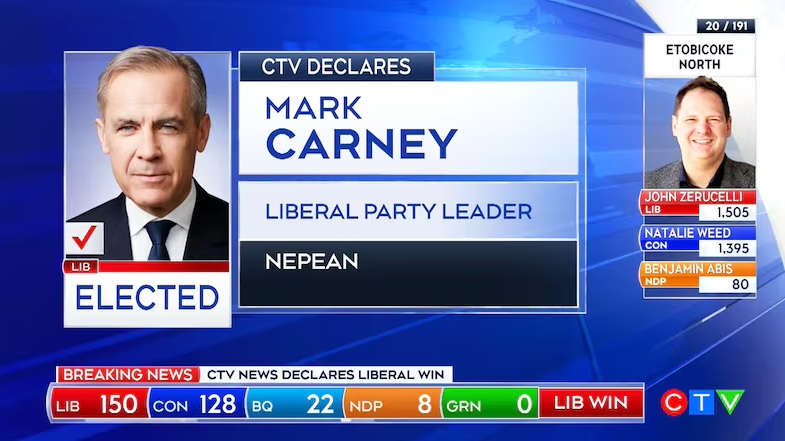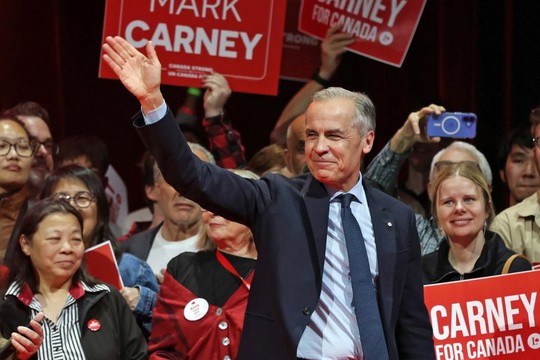Mark Carney used his victory speech to claim Trump wanted to ‘break us, so that America can own us’.
Photo: AFP
The remarkable campaign in Canada was upended by a backlash against U.S. President Donald Trump, which sparked a stunning liberal resurgence, writes POLITICO.
Canada’s conservative leader lost his own seat in Monday’s election to cap off a stunning electoral meltdown that saw the Liberal Party rise from the polling doldrums to secure victory.
Pierre Poilievre, who faced off against Mark Carney and the incumbent center-left Liberals, lost his seat in rural Ottawa to Liberal candidate Bruce Fanjoy, national broadcaster CBC reported.
Poilievre first won the seat in 2004 and held it for two decades. Despite the massive swing against him in Carleton, he signaled to supporters Tuesday morning that he would stay on as leader of the Conservatives — though at that point CBC had not yet projected his defeat.
“It will be an honor to continue to fight for you and be a champion for your cause as we go forward,” he said.
At the end of 2024, Poilievre was tipped to be Canada’s next leader up 25 points over unpopular then-Prime Minister Justin Trudeau.
But a remarkable campaign cycle dominated by U.S. President Donald Trump’s tariffs and inflammatory rhetoric about making Canada the 51st American state, along with Trudeau’s resignation and the rapid rise of former banking chief Carney, triggered a swift reversal of fortunes.

Only this campaign could have produced Prime Minister Mark Carney. The former banker with the sober demeanor of a natural technocrat persuaded millions of Canadians he was the guy to lead the nation amid an unprecedented onslaught of threats and ridicule from the brash President Donald Trump, POLITICO notes.
“Good luck to the Great people of Canada,” Trump messaged on Election Day, imploring Canadians to take his side over anybody actually on the ballot.
The outburst from the White House in the 11th hour of a snap election campaign served up yet another reminder to Canadians why they were prioritizing calm and competence above everything else.
Since returning to the White House, Trump has poked and prodded Canadians, enraging them with tariffs and annexation talk while whipping up patriotic sentiment.
When Justin Trudeau announced his resignation in January amid deep unpopularity, Carney was not yet a politician. By March, he’d been chosen by the Liberals to take over as leader and prime minister — and on Monday, millions of Canadians elected the seasoned banker as the antidote to Trump.
“My message to every Canadian is this,” Carney said early Tuesday morning with results still being counted. “No matter where you live, no matter what language you speak, no matter how you voted, I will always do my best to represent everyone who calls Canada.”
Most political observers did not predict that a numbers guy who lacked political experience could turn around his party’s fortunes. When Trudeau finally announced his resignation, the Liberals had reached a depressing nadir in the polls.
Conservative Leader Pierre Poilievre was 25 points ahead, all but assured of a win at the next opportunity. Liberal staffers had been jumping ship for months, and many of those who remained had lost hope of a comeback.
In January, transformative events rolled out at remarkable speed.
A newly inaugurated Trump ratcheted up his tariff fight with Canada and intensified his musings about absorbing the country. Carney was battling for the leadership with former Finance Minister Chrystia Freeland, whose resignation in December supercharged calls for Trudeau’s exit.
By the time he boarded his campaign bus, the Liberals had their first polling lead since 2023. He’d barely had time to measure the drapes, let alone hire a staff.
The polls kept getting better as a curious trend emerged: Progressive New Democratic Party voters were abandoning their flock for the centrist banker. Even Francophone voters in Quebec didn’t seem to mind Carney’s rudimentary French.
But don’t call that simple luck, says Seamus O’Regan, a former Cabinet minister who left politics before the election.
“There were a number of things that lined up for him, no question. But there’s always an opportunity to get that wrong,” O’Regan told POLITICO. “The onus is on [him] not to screw that up. There were all sorts of opportunities where he could have and he didn’t, and he’s proven himself to be a lot more adept at retail politics and strategy than a lot of people were giving him credit for at the beginning.”
When Trump was elected last November, Carney was still officially on the political sidelines, a perpetual politician-in-waiting looking for the moment to pounce.
For years, the banker with heaps of experience in both the private and public sectors had privately confided his interest in the Prime Minister’s Office.
When he returned from a seven-year stint atop the Bank of England, Carney’s tip-toeing into politics commenced in earnest. In 2020, when Trudeau dumped his first finance minister, Bill Morneau, The Globe and Mail’s sources mused about Carney making the jump.
Last summer, The Globe published reports of friction between Trudeau and Freeland. Both denied any trouble was brewing, but that jarring episode reignited rumors that Trudeau was courting Carney for a Cabinet role.
In September, he took on an economic advisory role with the party — another baby step into rough-and-tumble politics that timed to a brewing caucus rebellion in the fall.
By November, the internal fracas had failed to oust Trudeau. Then came the bombshell that instantly transformed Canadian politics.
On Dec. 16, hours before Freeland was set to deliver her government’s latest economic plan, she abruptly quit Cabinet. Again, the Globe reported that the PM had offered Carney a Cabinet job as minister of finance.
WIthin weeks, Trudeau was on the way out and Carney was in.

European leaders on Tuesday warmly congratulated Mark Carney on his election as Canada’s new prime minister, hailing the result as a boost for transatlantic relations in the turbulent age of U.S. President Donald Trump.
“Congratulations to Mark Carney and the Liberal Party on their election victory. The bond between Europe and Canada is strong — and growing stronger,” European Commission President Ursula von der Leyen said.
“I look forward to working closely together, both bilaterally and within the G7. We’ll defend our shared democratic values, promote multilateralism, and champion free and fair trade,” she added.
“The EU and Canada have a long and close partnership. We are allies and strong trade partners. We share the same values, and attachment to the UN Charter and the rules-based international order. We will continue working closely together, including in the G7 format,” said European Council President António Costa.
Carney, who previously headed up two G7 central banks and worked for more than a decade at Goldman Sachs, was elected Canada’s prime minister Monday night, after running on his economic record — and standing up to the belligerent Trump. Carney defeated the Conservative Party led by Pierre Poilievre, though it is still unclear whether he will run a majority or minority government.
“Congratulations to Mark Carney on your election victory,” British Prime Minister Keir Starmer said in a statement.
“The U.K. and Canada are the closest of allies, partners and friends… We will work together to deepen our economic relationship to deliver security for hardworking people in the U.K. and Canada — which we were both elected to do,” Starmer added.
Former U.S. President Joe Biden also congratulated Carney, praising his leadership qualities. “I’m confident Mark will be a strong leader for the fundamental values and interests Canadians and Americans share,” Biden said.
Carney’s campaign focused on “Trump-proofing” Canada and uniting a country that he said has witnessed a surge in patriotic sentiment in response to Trump’s suggestion that Canada could become the 51st U.S. state.
Following his narrow electoral win, Carney continued to strike a defiant tone against the U.S. president. “America wants our land, our resources, our water, our country. But these are not idle threats,” he said.
“President Trump is trying to break us so that America can own us. That will never happen,” he added.
read more in our Telegram-channel https://t.me/The_International_Affairs

 10:51 01.05.2025 •
10:51 01.05.2025 •























